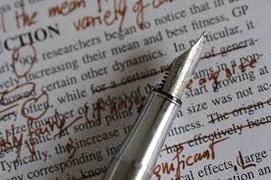
Having said this, I wonder how it could be otherwise. Comparing a self-published book to a traditionally published book is about as fair as comparing an independently-produced, small-budget film to a major Hollywood blockbuster. Both can be well-scripted, well-acted, and well-directed. In fact, the independent film could be more interesting or engaging on many levels, but in terms final product, the Hollywood film, regardless of how asinine its premise, will ultimately be more polished than the indie film.The reasons for this are obvious and I don't think I need to go into them - essentially, it all comes down to money and people.
Returning to the subject of books, traditional publishers employ a small army of proofreaders, editorial assistants, fact-checkers, and editors who pour over a manuscript as many as a dozen times to ensure all the i's are dotted and the t's are crossed, whereas most independent authors are the sole editors and proofreaders of their own manuscripts. At best, an indie author might have a small circle of writer-friends and beta-readers who might enjoy locating and eliminating textual anomalies. Regardless, it's plain to see that in terms of proofreading firepower, the self-published writer is utterly outgunned by traditional publishers.
Let's take it as a given then that the self-published book will not be as polished as the traditionally published book. Does that necessarily make the self-published book an inferior reading experience? If the text is absolutely saturated with outlandish errors of every kind, so saturated that it is often difficult to discern what the writer is trying to communicate, then I would have to say yes; however, I have seen many novels that suffer from the affliction described above go on to garner positive reviews and respectable sales. In some instances, horribly edited books have even become bestsellers. On the flip side, I have seen readers complain about self-published books that may have had two or three spelling mistakes, but were otherwise error-free.
In the end it might come down to an individual reader's error breaking-point. Some readers are able to tolerate many errors; others, none. It is interesting to note that readers of the most popular genres - romance, erotica, paranormal romance, young adult, etc., - tend to be the most forgiving when it comes to poor proofreading, while those geared more toward general, historical, or literary fiction tend to be the least forgiving. I won't go into the reasons why - all-in-all, I think it's fairly obvious.
Concerning my own novel, I owe a debt of gratitude to the small group of people who have read it thus far. They have been extremely gracious and forgiving about the typos and errors the text contains. I've proofread the novel twice since uploading it to Amazon a year ago. The first version of the novel was infected with errors. Subsequent versions have been significantly better. I'm in the midst of one final proofread at the moment. Hopefully, it will be my last. I doubt I will catch every error in the novel, but I'm sure to catch most and I sincerely hope that the few errors that might remain won't test any future reader's breaking-point.

 RSS Feed
RSS Feed

